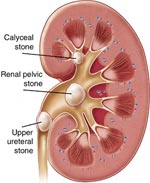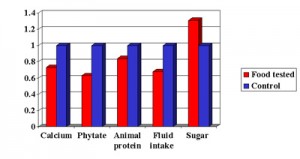Forget what your grandmother may have taught you about kidney stones. In the past there may have been a bias towards thinking that calcium may be one of the causes of kidney stones. But Dr. Curhan and collegues from the Channing Laboratory, Department of Medicine, Brigham and Womens’ Hospital, Boston, MA put this question to the test. Other food factors were also examined in this Nurses Health Study II, which was published recently in the Archives of Internal Medicine (in April of 2004) and reviewed by The Medical Post (Aug. 24, 2004 edition).
I have summarized the results in the bar graph below. What is shown is the cumulative risk for developing kidney stones in a population of 96,245 nurses aged 27 to 44 over eight years without a history of kidney stones in this prospective study. At the same time detailed records were kept regarding food and health habits. The risks between the highest and the lowest quintile regarding various food groups were computed, which is an accepted way to tease out the effects of the food group studied.
Dr. Curhan and his collegues found that calcium protects from getting kidney stones as does meat. Sugar is a risk for stone development. Fluid intake has a protective effect as uric acid and other stone forming substances are kept in solution preventing kidney stone formation. Phytates that are found in soybeans, beans and peas have a protective effect. The control value of the study was the average risk for the population, which was set at 1.0 meaning that there is no added risk to develop kidney stones.
| Relative risk of developing kidney stones from exposure to different foods in younger nurses |
Conclusion: Contrary to popular belief calcium and meat as well as phytones have a protective effect against the development of kidney stones. Fluid intake is protective as well. On the other hand sugar is a risk factor for kidney stones, a fact that seems to not be generally known.
More info on kidney stones: http://nethealthbook.com/abdominal-pain/left-upper-abdomen/kidney-stone-renal-calculus/
Ref.: 1. Dr. G.C.Curhan et al., Arch Intern Med 2004 Apr 26; 164 (8), pp. 885-91 2. The Medical Post, Aug. 24, 2004, p.17
Last edited October 26, 2014







